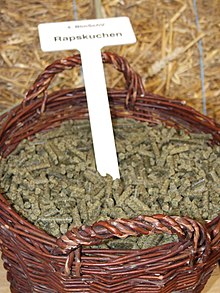Oil meal

The solid by-products obtained in addition to the oil during the processing of oil seeds and fruits are referred to as oil meal . The term is mostly used in the context of using the press residue as animal feed.
Types and uses
The composition and properties of the oil meal depend on the raw material used (various oil seeds and oil fruits ) and the method of oil extraction. Depending on the processing method, oil meal is also called press cake (when the oil seeds are hot or cold pressed) or extraction meal (when oil is extracted using solvents).
Oil meal of edible plants (especially soy and rapeseed meal, but also palm kernel, sunflower and corn meal) are usually used as high-quality protein feed in animal nutrition and serve as an alternative to feed legumes or animal and fish meal .
market
Soy meal and rapeseed meal in particular are traded in large quantities as animal feed around the world. Due to the worldwide growth in animal husbandry, especially in the emerging countries, the demand for protein-rich feed is increasing. The increasing demand for oil meal has an increasing effect on the global production of oil seeds.
Around 4.5 million tonnes of rapeseed meal and 2.7 million tonnes of soy meal are produced in Germany every year. In the European Union , 35.8 million t of soybean meal, 9.8 million t of rapeseed meal and 10.8 million t of other oil meal were consumed in 2008.
literature
- Siegfried Graser, N. Jack, S. Pantoulier (eds.): Agricultural markets 2007. Series of publications by the Bavarian State Institute for Agriculture. Vol. 4. Freising-Weihenstephan 2008, ISSN 1611-4159 .
Individual evidence
- ↑ Jörg Eggers, Kirstin Karotki, 2009: Protein feed and the dependence on imports from the world market. Graphic: Consumption and proportions of protein feed in the EU and Germany in 2008. Accessed on February 18, 2010.